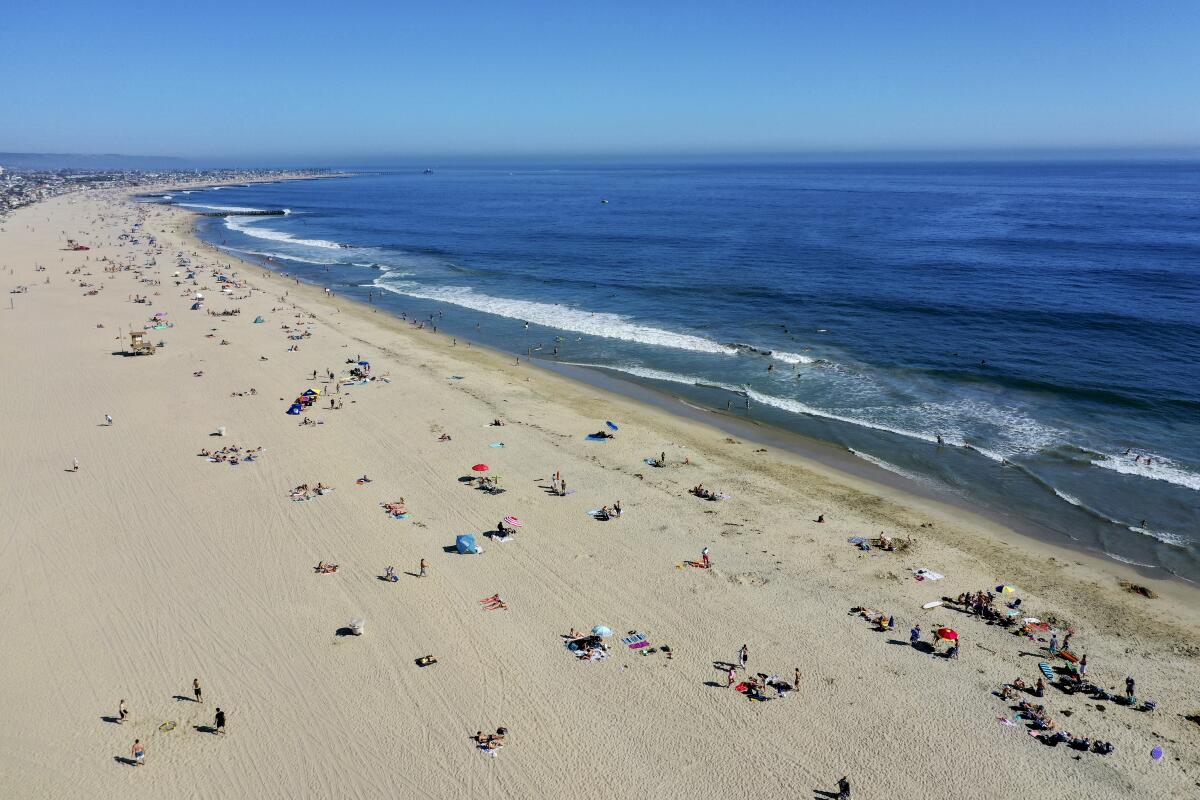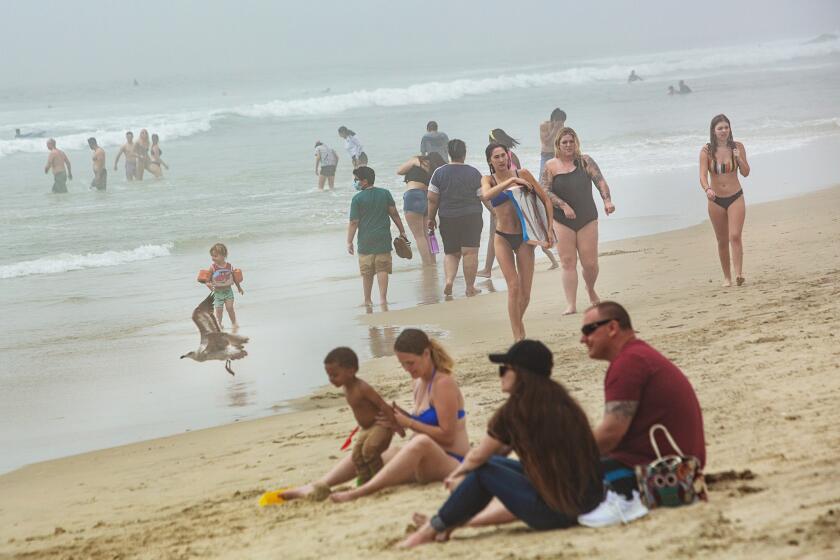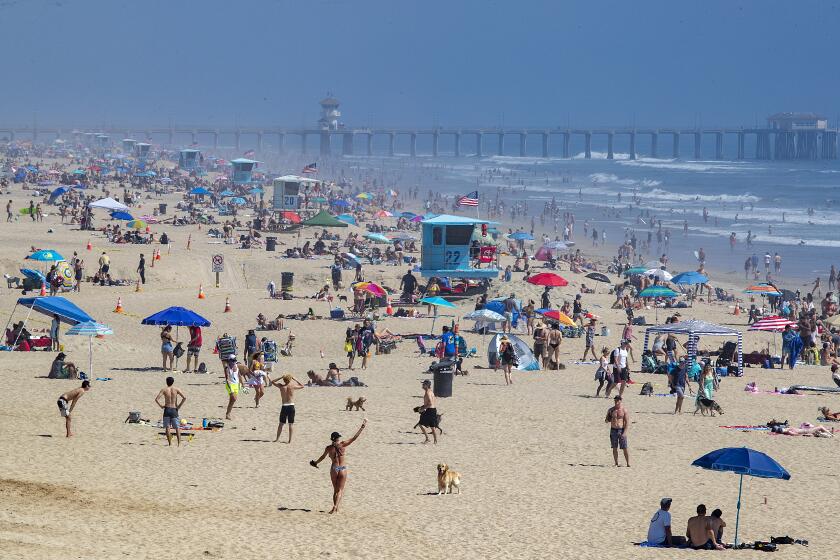Beach access unchanged in Newport Beach, but parking restrictions tightened

Newport Beach will not close its beaches.
Visitors will find even less parking and more police and lifeguard presence, but they will nonetheless have access to the sand and surf, a split City Council decided Tuesday.
The council voted 5-2 after fours hours of discussion to maintain access, two days after a heat wave sent tens of thousands of weary, cooped-up Californians to the beach after more than a month of stay-at-home orders to stem the spread of the coronavirus. Jeff Herdman and Joy Brenner were the dissenters.
“I absolutely vote no and wage an active protest from my district for not implementing these protections for them,” said Brenner, whose district includes Corona del Mar State Beach, a popular destination in times of pandemic and not.
Mayor Will O’Neill said the city needs to seize more educational and enforcement opportunities, but “we truly can trust the vast majority of people to do the right thing.”
“We clearly have to remind some people to do the right thing and for the people who don’t want to do the right thing, then they ought to be acquainted with our Newport Beach Police Department,” he said.
California is a shifting patchwork of locally controlled beach closures — notably, Los Angeles County beaches are closed but several in Orange County have stayed open. Now, local officials may revisit that access after seeing how many people answered the call of summery temperatures this weekend.
The council received more than 1,000 emails in two days after announcing that it would consider strict beach or road closures in light of the weekend turnout, with pleas to remain open outnumbering pro-closure messages nearly two to one.
Access proponents said people were maintaining personal buffers, and that the public beaches belong to everyone as an opportunity for stress relief and fresh air.
Closure proponents suggested restricting parking and beach access to residents only, subject to identification verification at checkpoints. Those who live closest to the beaches on Balboa Peninsula and CdM said previously closed parking lots shifted the burden to their curbside parking and maintained a river of foot traffic a few feet from their front doors and patios, making them feel trapped in their homes. They called the turnout “chaos,” “reckless,” and a “disaster” and predicted a spike in infections in coming weeks.
Several of those advocating for closures described the weekend scene as resembling the Fourth of July, a peak beach holiday.
But lifeguards’ headcounts don’t bear that out, the council found out Tuesday.
Lifeguards estimated about 40,000 beachgoers in Newport on Friday and Saturday, at the high end of a normal, sunny weekend in April — compared to the 100,000-130,000 on the Fourth.
“Of course, nothing feels normal right now,” O’Neill said. “This was very clearly a shock to the system.”
He further argued that beach cities in Los Angeles County, which shut down all of its beaches on March 27, have higher per capita coronavirus infection rates than any coastal Orange County city with open beaches, meaning closing beaches didn’t insulate those communities, he said.
Malibu, for example, has 216 known cases of COVID-19, the respiratory disease caused by the virus, per 100,000 residents and Santa Monica has 167 per 100,000 people, according to the Los Angeles County Department of Public Health. Newport has about 108 COVID-19 cases per 100,000 residents; neighboring Huntington Beach has 89 per 100,000 people, according to the OC Health Care Agency.
“We are in charge of the whole health of our whole community,” O’Neill said.
That includes combating COVID-19. “It also includes paying attention to the serious and pervasive health effects of social isolation,” he said.
Resident Lisa Johnson said the council’s priority should be protecting the well-being of Newport, “and not California’s mental health at large.”
Carl Chicka, who lives in West Newport, said there was a “conga line” of cars in his neighborhood and fistfights nearly broke out as cars snapped up private spaces.
“You sense the pent-up ire on the people who were looking for parking and circling literally for hours,” he said. “It was a very aggressive sense of energy.”
City leaders committed to greater resources this weekend to manage traffic and pedestrians.
Police Chief Jon Lewis said he would assign more officers on Balboa Peninsula and in Corona del Mar. Fire Chief Jeff Boyles said he would post 37 lifeguards around the beaches, up from the typical 18 to 25. Public works will keep the major parking lots closed as they have been for weeks, plus lots farther inland on Superior Avenue and 26th Street.
As temperatures soared into the upper 80s in some parts of the region on Saturday, crossing county lines was like entering different worlds.
Councilman Kevin Muldoon, who is also a strong voice for reopening the economy, said fear and frustration should not restrict fundamental rights.
“American citizens are responsible and they have rights to assemble and right of free movement,” he said. “With these rights come responsibilities, and I’ve seen these responsibilities being manifested in everyday behavior from folks who are visiting the city.”
Herdman, who represents Balboa Island, said stay-at-home orders would end sooner if people would cooperate with them now.
He said past Fourth of July statistics mean nothing today.
“Just the simple fact that we had 40,000 people on our beaches who were under an order from the governor to stay home is what is significant,” he said.
All the latest on Orange County from Orange County.
Get our free TimesOC newsletter.
You may occasionally receive promotional content from the Daily Pilot.






